DECEMBER 2024
Maren's Blog
Maren Duffy, undergraduate student
1 December 2024
Hello everyone!
The quarter is coming to a close and I am looking forward to Thanksgiving and Christmas break! I have planned a quick camping trip out on Lopez Island for Thanksgiving break and I will be going home to see family for Christmas. It’s looking really cold in Alaska right now but I can’t wait to see the snow! The last couple weeks of school have been extremely packed, but it's been a good fall so far. Also, since the chum have been running at the creek, the seal activity has been great and outside of observations I often go down to watch the action.
Haley and I have also been continuing work on the salmon data for our project, currently figuring out ways to best organize it. Canada and Washington organize their public salmon abundance data very differently so we have done a lot of reorganizing and talking over the best ways to work with it. But it is headed in an exciting direction. We also have been working with Alex and Holland Conwell to make a GIS map for Holland’s paper. It has been great to apply skills we have learned through our project on new ideas, and we have made a cool little map so far!
Lastly, earlier this month I applied for a marine mammal technician job in Anchorage, Alaska at the military base JBER to work on a project observing and monitoring the Cook Inlet beluga population, and I recently heard back and got the position! I am so excited to continue working on marine mammal research, especially in my home town with a marine mammals species I grew up learning about. I start after graduation in Spring 2025, and I have been feeling very appreciative of MMEL and the experience it’s given me.
Until later,
Maren
Rachel's Blog
Rachel Strober, undergraduate student
1 December 2024
Hey everyone,
I hope you all had a great Thanksgiving! It has been nice to have a short break before finals season. My break was a bit longer this year as I took the opportunity to go to a coastal conference in Oregon. It was great to meet people from all up and down the coast with various roles and interests in the marine science field. I learned about a wide range of subjects, such as the idea of reintroducing sea otters on the Oregon coast, kelp health and restoration, and even methods for tracking the movement and behavior of various shark species.
My project has been much of the same, as I continue researching Pacific Salmon y-chromosome protein sequences, and parameters for designing a qPCR probe. As I continue that research, I am also transitioning from writing my outline to developing a full project proposal. All the while, I have still been enjoying performing scat extractions for Dr. Erin D’Agnes’s harbor seal diet study.
The Whatcom Creek project has been in full swing as well, with an abundance of harbor seal sightings and even two sea lions! The creek was very active this fall, with the most seals and salmon I have seen in my experience with the lab so far. It’s always sad to see the season of high activity winding down, but it makes every fall that much more exciting!
Until next year,
Rachel
Haley's Blog
Haley Recob, undergraduate student
1 December 2024
Hi everyone,
Happy Thanksgiving! I hope everyone enjoyed some family time and plenty of food this past weekend. I have been lucky enough to spend this week with my family, eating lots of turkey and mashed potatoes!
The past month has been busy with school, exciting observations at Whatcom Creek, and organizing data. It’s been my busiest quarter yet and it is bittersweet that it is coming to an end soon with finals week right around the corner.
Maren and I have been tackling organization of the large amount of salmon abundance data from WDFW and the Canadian database escapement reports. So far, we’ve sorted the data into different spreadsheets and compiled the reports to get the exact number of salmon spawning at nearly every creek in the Salish Sea watershed. We refined this data to only include the years when the harbor seal sex ratio data was collected. We plan on condensing the data further by combining the number of returning salmon into the estuaries they pass through to get to their natal stream as this is where they may be preyed on by seals. We’ll soon also have to start looking at the estuary distance from the haul out sites. Next quarter I am sure will be filled with lots of spatial analysis.
As for the Whatcom Creek project, it has been very successful this past month! Nearly every observation, we fill out over a dozen pages of seal behavior data. We’ve seen plenty of seals and multiple sea lions, preying on spawning chum salmon. It’s been very exciting and I expect the seals to be in the creek through the first few weeks of December as well.
That’s all for now, and Happy Holidays!
Haley
Alexandreas's Blog
Alexandrea Otto, graduate student
1 December 2024
Whale, hello!
Oh my, a Minke whale stranded deceased by ship strike in Tacoma, WA this month. What a sad and surreal situation was an educational moment indefinitely. Dyanna, my stranding internship supervisor, had only been a part of two other Minke necropsies, so I was filled with deep gratitude that I could be a part of such a rare opportunity. After the necropsy, I even helped flense and remove over 2,700 pounds of body to expose/remove the skeleton for the MaST Center to reassemble (takes about 2 years for assembly) and use as an educational tool. The skeleton alone was about 400-500 pounds! Woah is my body sore from all the heavy lifting, but what was really neat with the accessibility after removing the skeleton was, we were able to find several broken vertebrae bones that wouldn’t have been visible without the skeleton removal. Read more on about the details here on Cascadia Research Collective’s website: Minke whale found dead in Tacoma was killed by a ship - https://cascadiaresearch.org
Apart from busy, busy times with my stranding internship and thesis writing & data analyses all at the same time, I had the fortunate opportunity to attend the 25th Biennial Conference on the Biology of Marine Mammals (SMM) in Perth, Australia! Let me tell ya, 48 hours of straight travel time and over 20 hours of flight time is not to be taken lightly. How amazingly worth it though it was to attend. I cannot write all the incredible moments and details in one blog post but my advice is to anyone that has the possibility of attending one of the Biennial SMM conferences and your heart is in the niche of marine mammal conservation, find funding & attend!
A past undergraduate MMEL member, Rachel Meade, was there as well as Erin and Casey from Wild EcoHealth and WDFW! Presentations were very inspiring for future research ideas and had many numerous super cool recent marine mammal findings-including an artificial nest for ringed seal mothers and pups as the ice continues to disappear! I made friends with many international fellow students through volunteering and even met established researchers in the marine mammal field that I had only read their papers from over the years! I met old mentors and friends that were part of my first introduction and inspiration to this field. Additionally, I met new acquaints as well! I was lucky enough to also present a four-minute talk as well that I wouldn’t have been able to do at all without the never-wavering support of Dietmar & Alejandro! While in the southern and eastern hemispheres for the first time, I took a day to go see the breath taking natural, un-touched beauty of Australia on Rottnest Island and I was able to witness the Australian fur seal and endemic Qouakka!
Selas & Salmon,
Alex
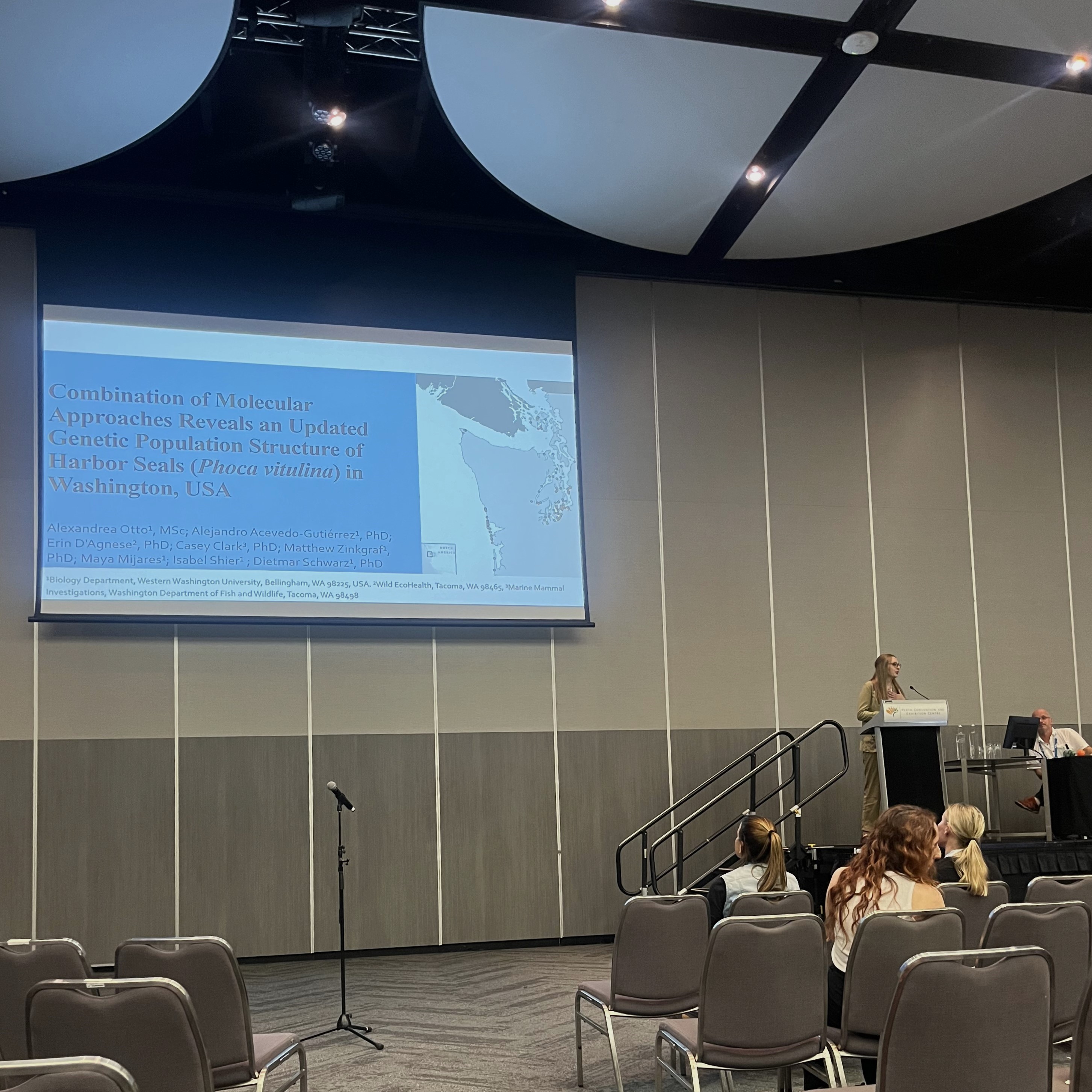
Presenting 4-minute presentation at 25th Biennial Conference on the Biology of Marine Mammals in Perth, Australia. Photo by R. Meade.
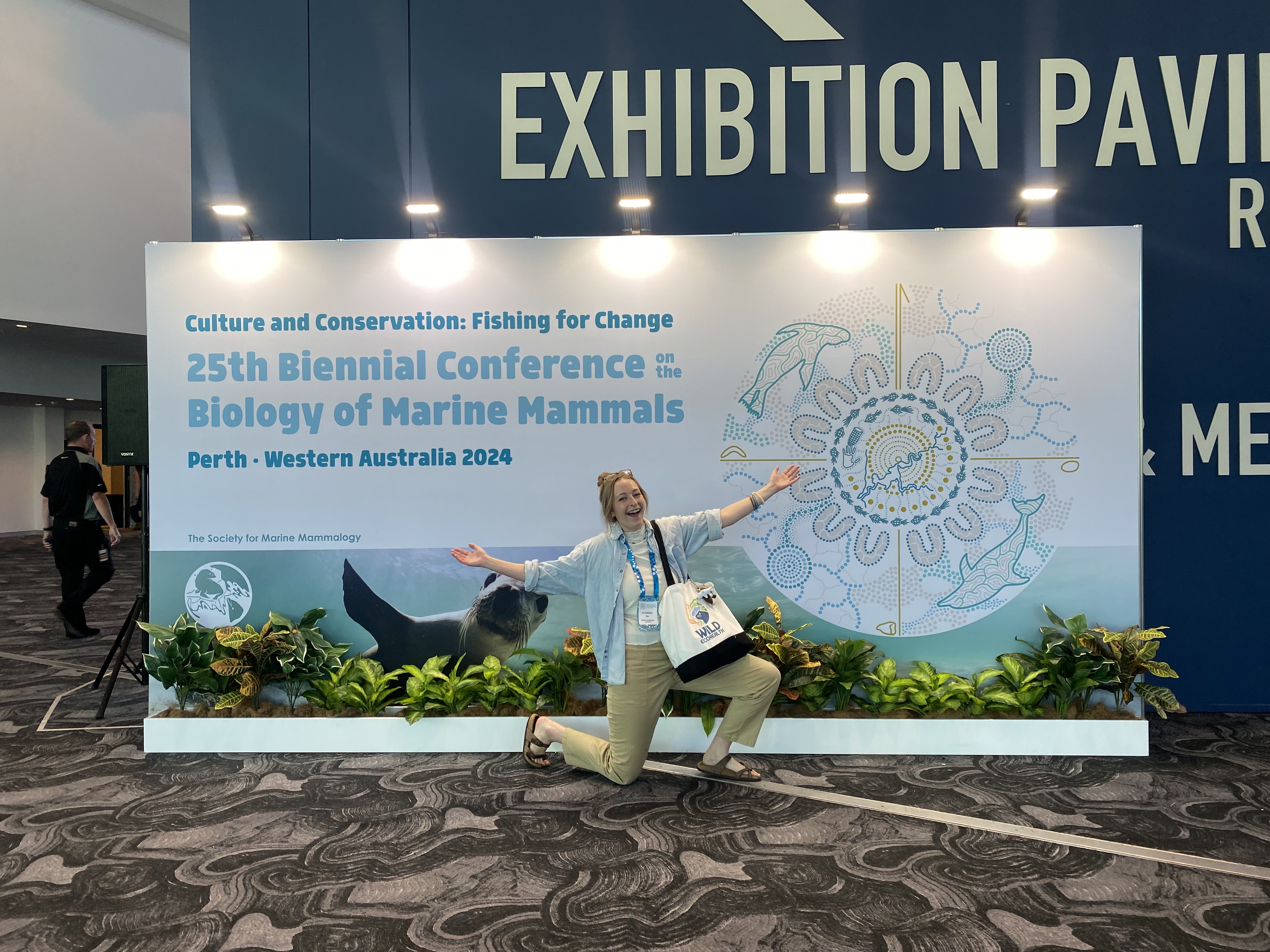
Outside the 25th Biennial Conference on the Biology of Marine Mammals. Photo by R. Meade.
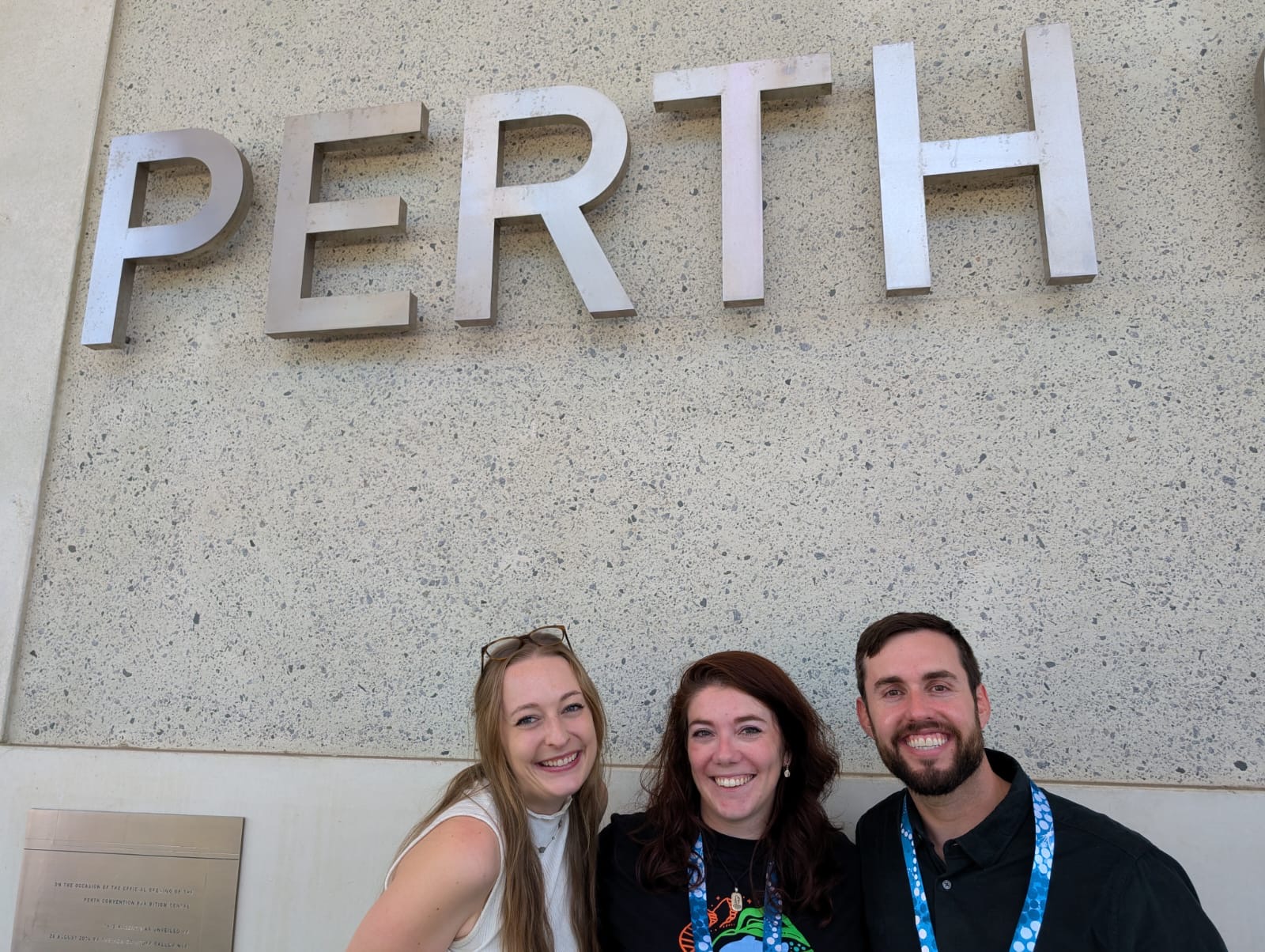
Right to left: Casey Clark, WDFW, and Erin D’Agnese, Wild EcoHealth. Photo by Mike J.
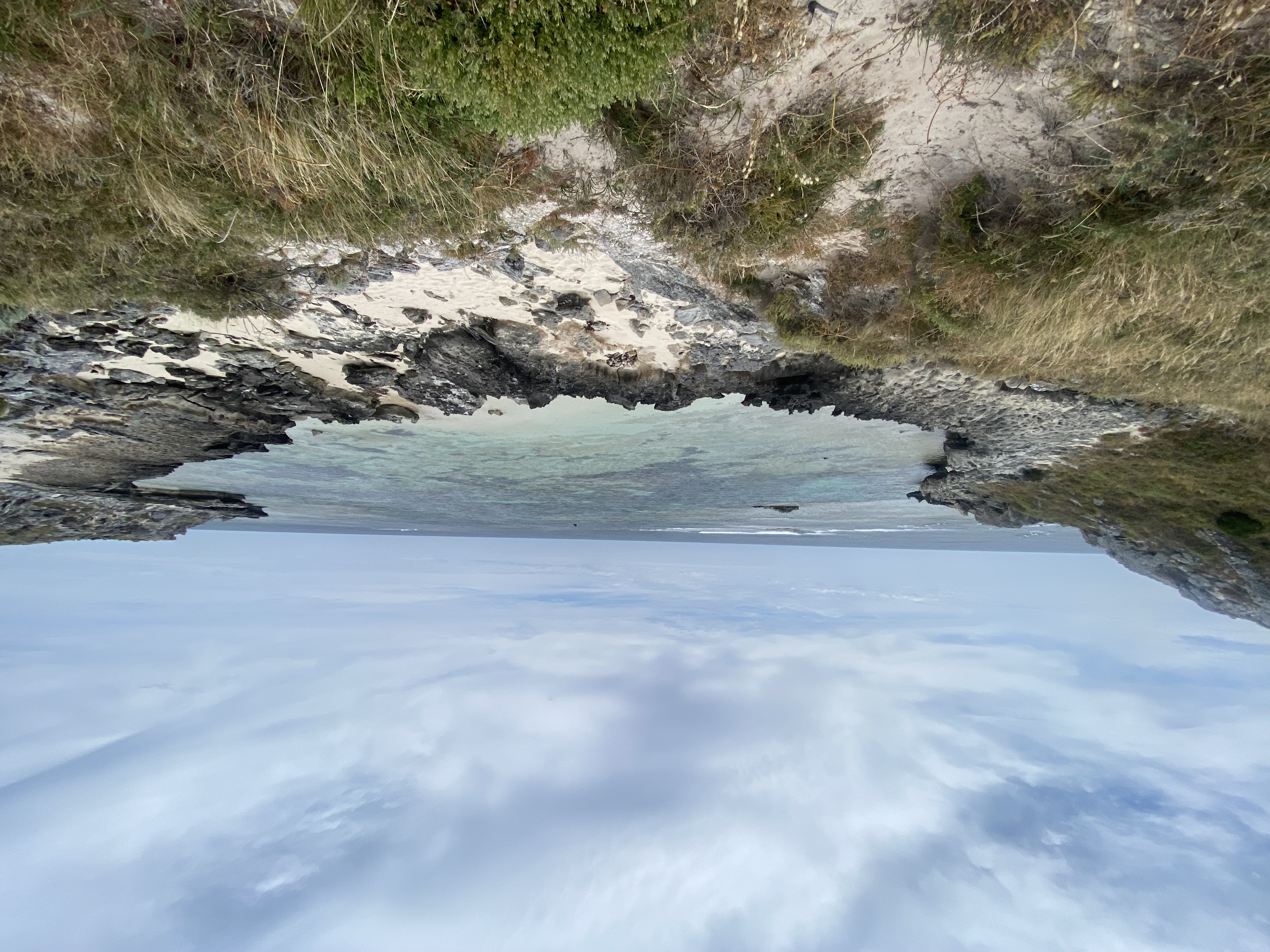
Rottnest Island, Western Australia beach. Photo by A. Otto.
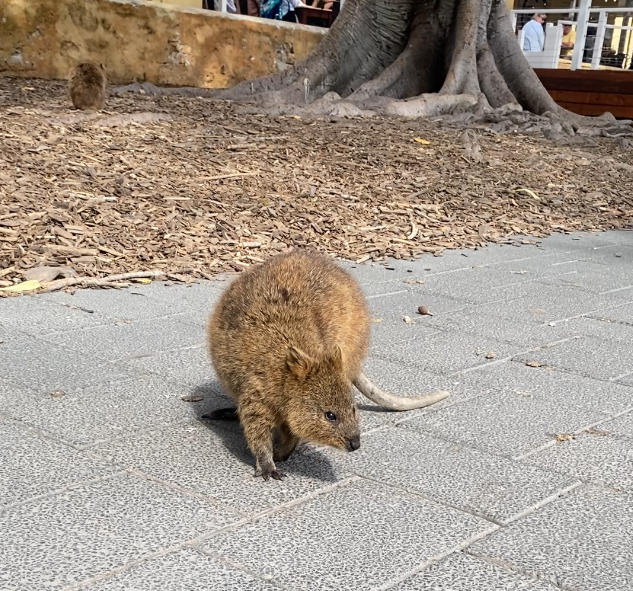
Endemic Qouakka! Photo by A. Otto.
Zoe's Blog
Zoe Hosford, graduate student
1 December 2024
Hi everyone!
I hope everyone had a lovely holiday! I got to fly to Michigan to spend Thanksgiving with my best friend who is getting her PhD in Audiology.
The quarter is coming to a very quick close and I am looking forward to making it back to the east coast for Christmas! I can’t wait to see my family for the first time since September, spend some quality time with friends and play around in the snow.
The last few weeks have been very busy, with coursework, teaching, and thesis writing… but it feels like I’m finally getting somewhere! My BIO 101 students just finished up their big quarter long poster presentations, and they all did amazing. Teaching this quarter has been stressful and long but has been so rewarding at the same time. Getting to know my students, their stories and goals/aspirations, whether it be in science or their field of interest, has been so inspiring for me!
The thesis proposal writing is coming along… slowly but surely. I am still working through figuring out the methods for data analysis in order to create proper models. I have been doing a lot of scientific reading and studying to hopefully figure out the kind of model and analysis that I will have to use to show the relationship between transient killer whale presence and harbor seal haul-out usage. Along with that, I will also hopefully have all of my data in hand by the end of the year. I am just waiting for the data contribution from WDFW to be sent along.
t's hard to believe my first quarter of graduate school is already almost over… time flies, but I wouldn’t want it any other way!!
Until next month. Happy Holidays!
Zoe
Ellie's Blog
Ellie Taylor, undergraduate student
1 December 2024
Hello everyone,
Hope you’ve all had a restful week as we approach the end of the quarter! This month has been hectic with classes, but I've been trying to squeeze in as much lab work as possible. As I'm continuing to perform scat extractions for Erin D'Agnes's study, an analysis on Harbor Seal diets. I have begun working with Dawson to process Northern America River Otter scat samples. I am thrilled to be collaborating with Dawson, as his research explores areas that are relatively new to me, which provides ample learning opportunities.
Meanwhile, our field observations at the log pond have been running daily throughout the week. Although we are noticing a decline in seal abundance as the season progresses, these observations remain crucial for monitoring their interactions with their environment.
Wishing you all the best of luck on your finals and looking forward to a break over the holidays!
Cheers,
Ellie
Victoria Vinecke, graduate student
1 December 2024
Hey folks,
It has been nice to have a little break and spend time with loved ones during this holiday season. As someone who conducts research on and benefits from the ancestral homelands of the Coast Salish Peoples, this November I spent time reflecting on how I can honor/support/give back to tribal and Indigenous communities during Native American Heritage Month. Thanksgiving is celebrated during November and seen as a day of gratitude for lots of people but for many Indigenous communities seen as a day of mourning. Through personal research and reflection, I have come up with a list of ways to honor/celebrate Indigenous communities on thanksgiving and most importantly, year-round. 1) Educate yourself on the origins of thanksgiving through the perspective of the Wampanoag tribe and separate truth from myth. 2) Donate to Indigenous organizations. 3) Purchase Indigenous goods and services. A local favorite of mine is the Lummi Seafood Market. 4) Add dishes with Indigenous ingredient to your dinner such as locally caught salmon or making three sisters soup with local ingredients. 5) Instead of watching football on thanksgiving you can watch an Indigenous movie. Being from Idaho, a favorite of mine is Smoke Signals which is a coming-of-age story focusing on members from the Coeur d’Alene reservation. 6) Attend Indigenous events, seminars, and museums. 7) Lastly, support Indigenous communities through volunteering, voting, and continuously educating yourself on Indigenous-led initiatives.
As for my thesis, I have been focusing on writing and tying up molecular loose ends. I am starting to see the finish line, and it will be a full sprint to get there by the end of winter quarter! I hope to have a draft of my background/intro/methods to my committee sometime this month and start writing up my results/discussion! Wish me luck as I dive into weeks of writing!
Wishing you all the best of luck on your finals and looking forward to a break over the holidays!
Until next time,
Victoria
Dawson Little graduate student
1 December 2024
Hi y'all,
Hope everybody had a wonderful Thanksgiving! This past month has been a bit of a whirlwind balancing classes, thesis research, and job responsibilities. I’ve begun wrapping up my first quarter here at Western, and I can say that everything has been absolutely wonderful.
I’ve continued to make good progress on my thesis research. Fellow lab members, Chloe and Ellie, have been kind enough to assist me in processing river otter scat samples which has been a huge help. We spent time learning protocols for separating hard parts (i.e. fish bones, crab carapaces) and homogenizing fecal material in ethanol to be sent off to the Washington Department of Fish and Wildlife Molecular Lab for metabarcoding. Additionally, I’ve begun training Makah Fisheries staff in hard parts identification with the help of previous MMEL member, Bobbie Buzzell.
I’ve filled out filled research applications for the Seattle Aquarium and Oregon Zoo in an attempt to receive sex-confirmed scats samples for both male and female North American river otters. These samples will be used in the design of molecular primers to identify the sex ratio of river otters in my scat samples. I was fortunate enough to be a part of a panel for the WWU chapter of the Society for the Advancement of Chicano and Native American Students along with fellow MMEL grad student, Victoria Vinecke, which was a very rewarding experience.
I’m also looking forward to attending the Washington Sea Grant European Green Crab Trapper’s Summit next week where I will be representing the Makah Tribe speaking about our research removal efforts of European green crab over the last year.
Otters and Crabs,
Dawson